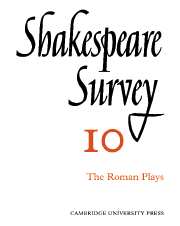Book contents
- Frontmatter
- Shakespeare’s Roman Plays: 1900–1956
- Shakespeare’s ‘Small Latin’—How Much?
- Shakespeare and the Elizabethan Romans
- The Metamorphosis of Violence in Titus Andronicus
- From Plutarch to Shakespeare: A Study of Coriolanus
- The Composition of Titus Andronicus
- Classical Costume in Shakespearian Productions
- Shakespeare’s Use of a Gallery over the Stage
- Lear’s Questions
- “Egregiously an Ass”: The Dark Side of the Moor. A view of Othello’s Mind
- Shakespeare in Schools
- Shakespeare Festival, Toronto, Canada
- International Notes
- Shakespeare Productions in the United Kingdom: 1955
- Drams of Eale, A Review of Recent Productions
- The Year's Contributions to Shakespearian Study 1 Critical Studies
- 2 Shakespeare’s Life, Times and Stage
- 3 Textual Studies
- Books Received
- Index
- Plate Section
Shakespeare and the Elizabethan Romans
Published online by Cambridge University Press: 28 March 2007
- Frontmatter
- Shakespeare’s Roman Plays: 1900–1956
- Shakespeare’s ‘Small Latin’—How Much?
- Shakespeare and the Elizabethan Romans
- The Metamorphosis of Violence in Titus Andronicus
- From Plutarch to Shakespeare: A Study of Coriolanus
- The Composition of Titus Andronicus
- Classical Costume in Shakespearian Productions
- Shakespeare’s Use of a Gallery over the Stage
- Lear’s Questions
- “Egregiously an Ass”: The Dark Side of the Moor. A view of Othello’s Mind
- Shakespeare in Schools
- Shakespeare Festival, Toronto, Canada
- International Notes
- Shakespeare Productions in the United Kingdom: 1955
- Drams of Eale, A Review of Recent Productions
- The Year's Contributions to Shakespearian Study 1 Critical Studies
- 2 Shakespeare’s Life, Times and Stage
- 3 Textual Studies
- Books Received
- Index
- Plate Section
Summary
Shakespeare has, at various times, received some very handsome compliments for his ancient Romans; for his picture of the Roman world, its institutions, and the causation of events; for his representation of the Roman people at three critical stages of their development: the turbulent republic with its conflict of the classes; the transition from an oligarchic to a monarchic government which was vainly delayed by the assassination of Julius Caesar; and the final stages by which the rule of the civilized world came to lie in the hands of Octavius Caesar. These are quite often praised as veracious or penetrating or plausible. Moreover, the compliments begin early, and they begin at a time when no high opinion was held of Shakespeare’s learning. The name of Nahum Tate, for example, is not a revered one in the history of Shakespeare studies; yet in 1680 he wrote:
I confess I cou’d never yet get a true account of his Learning, and am apt to think it more than Common Report allows him. I am sure he never touches on a Roman Story, but the Persons, the Passages, the Manners, the Circumstances, the Ceremonies, all are Roman.
- Type
- Chapter
- Information
- Shakespeare Survey , pp. 27 - 38Publisher: Cambridge University PressPrint publication year: 1957
- 4
- Cited by

